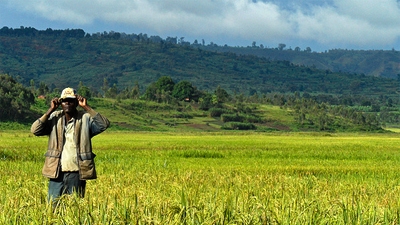BUBANZA PROVINCE, June 12, 2012 — Next to a little stream in Gihinga Commune, Bubanza Province, Burundian women farmers are proudly showing off their common field of tomatoes. They received US$5,000 in development assistance and contributed US$2,700 themselves. They have cultivated one hectare, producing more than eight tons of tomatoes.
Tomatoes have made good money, and they are already enlarging their production by renting new fields from the locality. Their common kitty is serving to pre-finance the purchase of seeds and fertilizer, also for their individual plots, while their original financial contribution has remained intact. By working together, they are all individually better off, having purchased of new clothes, reading glasses, building materials and bicycles.
The women farmers were given seeds and fertilizer as a one-off provision by the Bank’s Agro-Pastoral Productivity and Markets Development Project, PRODEMA. Sustainability would have been achieved if the women had used the seeds and fertilizer only on their individual fields. But by investing mainly in the Twiyungunganye Bakenyezi Association’s common field, they have managed to develop a growing common fund which now empowers the women in many ways, including for advancing agricultural credit to themselves.
“We would have made even more money if our onions were not stolen,” explains their chairperson. “When we were about to harvest, there was a scarcity of onions. Thieves stole them all. However, in spite of this, we persevered and succeeded.”
The Twiyungunganye Bakenyezi (Women Let’s Get Together) Association is just an example of the way Burundian farmers are using ingenuity and social responsibility to make a windfall last. While they had received tech support and guidance from PRODEMA, they have taken that guidance even further in many innovative ways.
In the hilly landscape of Ngozi, in the Mwumba Commune, the Twijukirikorwa Vy’iterambere Association has received three goats for each of the 30 associating households. They have developed an intricate set of rules for the management of their goats as well as for their common potato field.
“Members cannot sell the goats,” explains their chairperson. “They have to wait for their numbers to increase. Then, they can only sell them with our permission and pay a certain percentage of the sales price to the association.”
In effect, while the goats have been given to the individuals, their ownership is shared between the individual and the association.
All groups have made up their own rules based on their circumstances, common sense and social responsibility. Some basic traits, however, seem to emerge. The poorer communities tend to hold on to the initial project finance as the association’s principal capital. While cows or goats may be given to individual households, they remain the property of the association. Individual farmers have ownership rights over the future offspring, but only in a partial manner. They can benefit from the manure, which is invaluable for agricultural productivity. For the milk, members often have to pay half or a liter of milk to the association each day. While there is less emphasis on a large common fund in better-off communities, there is still much social pressure and control.
The project also has the side effect of distributing improved varieties. In the Mpanda Commune of Bubanza, Tujijuke Producers’ Organization has planted two hectares of disease-resistant cassava.
“We shall get a good income” explains one of the members, “not only from selling the cassava but also the cuttings.” They will now supply disease resistant cassava to the locality. Their field stands in stark contrast to the adjacent fields where plants are sparse, wilting away with the cassava mosaic disease.
Some groups are experiencing malnutrition, with evident signs showing on the children. For the Dukinigiribidukikije in Ntaho Association, for instance, additional support is required. Bio-fortified crops such as orange flesh sweet potato and iron- and zinc-fortified beans will now be supplied to them, alongside the standard issue of crops and livestock. As the Burundian farmers have discovered how to make a windfall last, it is now much easier to integrate new elements within the model.
All groups have well thought out future plans. “With the income we are making as an association, we shall buy a new field, coffee plants and some cows,” said the chairperson of Twijikiribikorwa in Nyamurenza. “We are also thinking of buying a vehicle in the future.”

